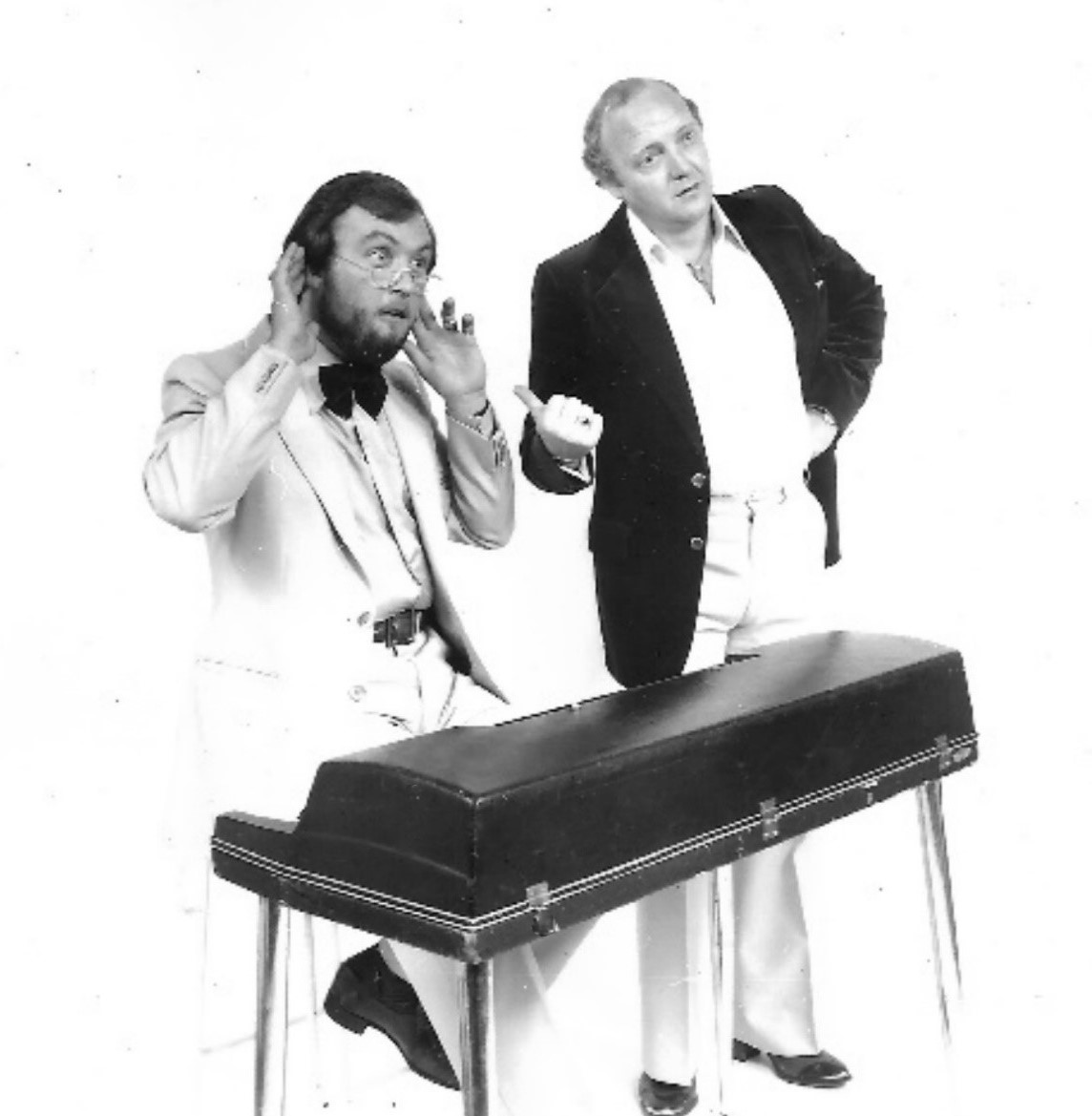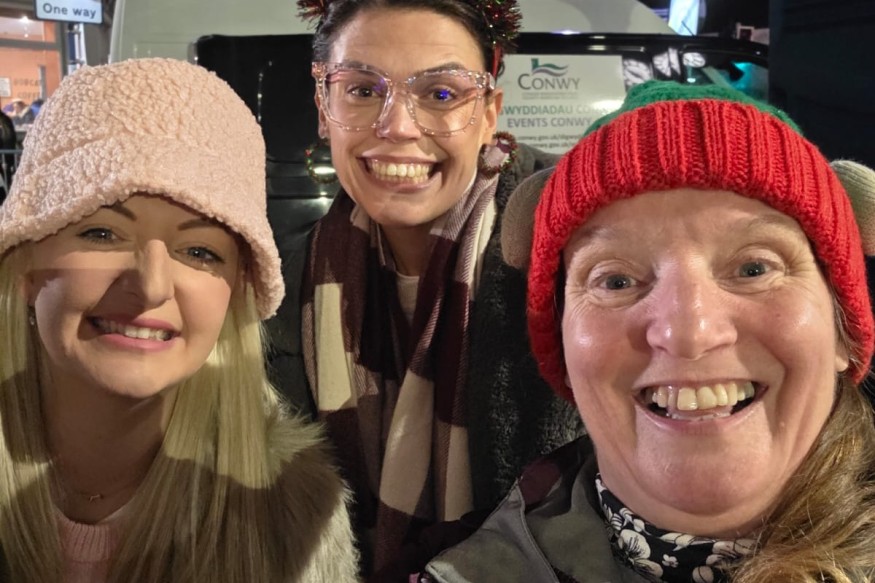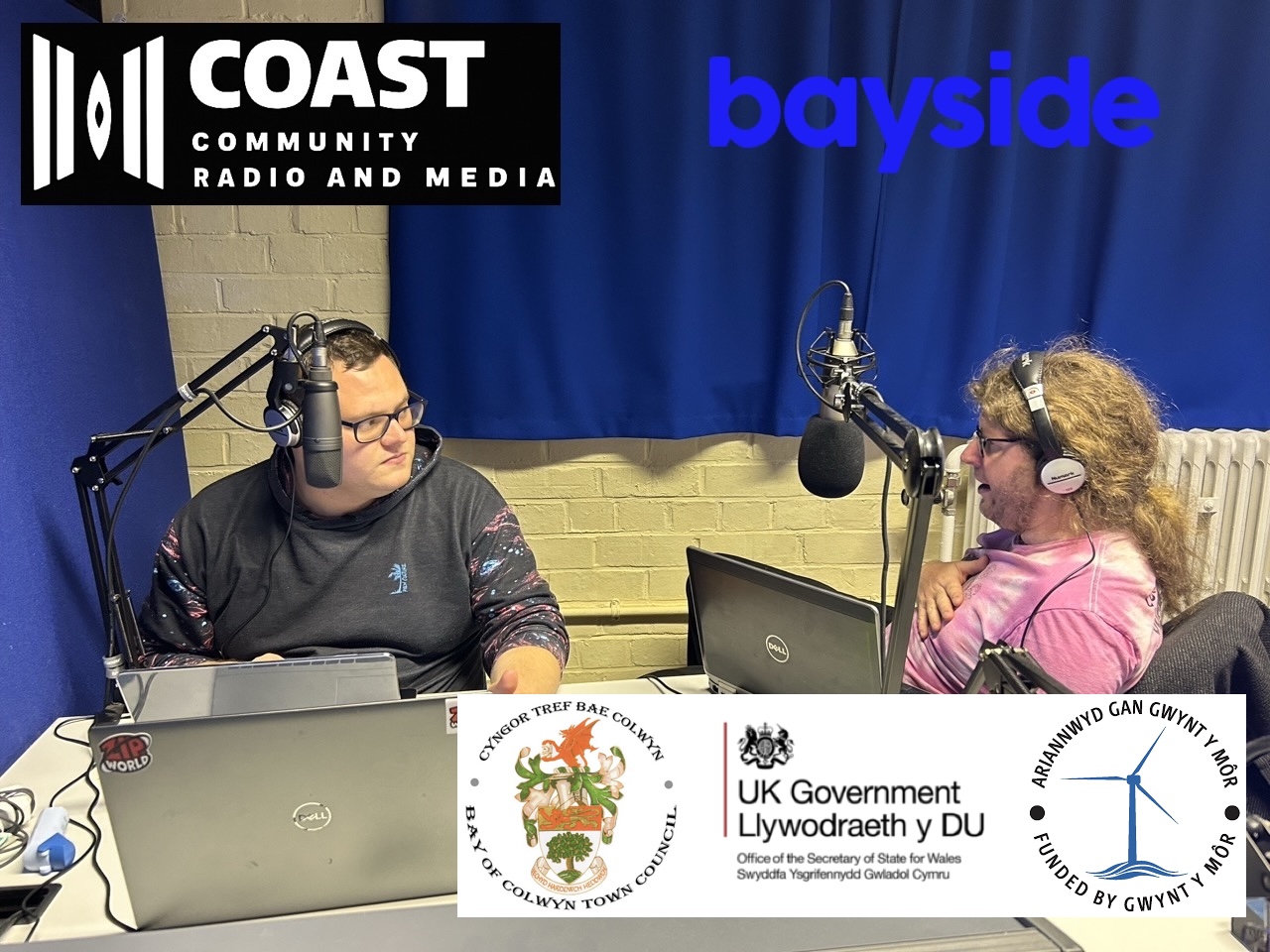Emyr and Elwyn Story Episode 04
BBC Wales, The Llandudno Pier Pavilion and S4C
Our return to Wales was highlighted by the news that Emyr had been cast as the character, Edgar Sutton, in the BBC Welsh language soap opera, “Pobol y Cwm”. One of Emyr’s ambitions was to become a professional actor and a part in this BBC flagship would raise his profile and provide him with medium to long-term financial security. For the next 3 months, he would spend at least 5 days a week in Cardiff.
Also on the horizon for the BBC was the idea of a programme located at the forthcoming Urdd Eisteddfod in Maesteg at the end of May. The Producer was Allan Cook. Participating in the series of six programs were Emyr, Geraint Jarman and myself. The idea was that the three of us ran a sort of travelling circus. Geraint was the star, "Puw Pelydryn", Emyr took the part of the circus fool called "Gwilym" and I was "Professor Rufus Prysor", the Magician and Organist. The series would need a signature tune and some original songs for the children to sing during the sequences containing audience participation. There was, therefore, a great deal of preparation work and it was difficult to allocate rehearsal sessions with Emyr because he was spending so much time in Cardiff.
The summer season was fast approaching and the next surprise was a phone call from the producer, Clive Stock. Clive had been producing summer shows in Llandudno with his partner, the organist Robinson Cleaver, for several years, usually at the Arcadia Theatre. But this year, he had reached an agreement with Aberconwy Borough Council to hire the Pier Pavilion for the 1979 season. Instead of producing a traditional variety show with a comedian taking the lead, "No, this year there'll be a different show every night", said Clive.
It was an impressive programme of events, every Monday night, the comedian Wyn Calvin, presented his, "Guest Night". On Tuesday nights, the “Black and White” minstrel, Dai Francis appeared as Al Jolson. For Thursday nights, Clive managed to bring two stars from the 1930s, Anne Zeigler and Webster Booth, out of retirement to lead the cast in, "The Golden Years of Music Hall". The last show of the night Friday was the popular TV quiz, "Mr and Mrs", presented by Derek Batey.
We were keen on discussing the financial side with Clive, who was known to be very careful with money. The fee was nowhere near the figure we could command in the clubs, however, we agreed to do the series. The feeling between the three of us was that being, "top of the bill", was a positive step in terms of publicity
The weekly show began on May 15th with the title, "Welsh Serenade". Llanddulas Male Voice Choir opened the evening followed by the singer, Ann Coates and to close the first half, the harpist, Heulwen Hâf. After an interval of 15 minutes, we took to the stage with the theatrical version of our 50-minute club act.
There was no need to rehearse the act. This was the act we had developed and polished for the past seven years. Of course, there were elements that changed from night to night, the occasional song or joke, but the rule was "If it works, keep it in". This applied to jokes or comedy routines. One popular routine was, "The Opera". I composed an opera for six characters, a Soldier, Blodwen his lover, Blodwen's mother, Major Rodney Farquhar and Sergeant Caradoc of the local constabulary. Emyr played each part and wore a different hat or wig for each character. As the story developed, the tempo increased and Emyr was completely confused by the hats and wigs. By the end of the piece, the audience was delighted. The duration was between 8 and 10 minutes and was the highlight of the act.
Another routine we developed over the summer season at the Pavilion was that of the "Deaf Pianist." The practice was not original, the comedian, Frankie Howard, did something very similar back in the fifties. "Look at her, Madame Acarté, the poor soul, deaf as a post she is," and the Madame seemed to be completely deaf and continued to smile while Frank spoke to the audience, "No, no don't mock the afflicted". I always thought the situation was very funny, so I began to pretend to be deaf when Emyr spoke to me and the audience reacted the same way as they did for Frankie Howard. "The deaf pianist, Robs, keep him in!" said Em on the way home.

Gari Williams and the deaf pianist, Rufus Prysor.
Only one thing affected our relationship with Clive Stock, the contract we had signed with BBC Wales. The series for children, now with the name, "Pier Maesteg", was to be recorded during the last week of May at the Urdd Eisteddfod field in Maesteg. So Emyr and I had to stay down in Maesteg from Monday to Saturday. But we had also signed an agreement with Clive Stock to be at Pier Pavilion at half past eight every Wednesday night. We arranged a meeting with Clive to explain the situation, we only needed one night off on May 30th. “No, no, no, you've signed a contract, you can't just opt out when it suits you. No, you will have to get here by 8-30 p.m., if you don't, you'll be in breach of a binding contract." Those were Clive's last words before he walked back to his car. We, therefore, had no choice, on May 30th, after 10 hours of filming on the eisteddfod field, we jumped into the car at 5 o'clock in the afternoon and Emyr drove the 200 miles from Maesteg to reach Llandudno just after 9 o'clock. Elwyn was nervously waiting for us as we hurriedly changed into our stage suits and went on stage at 9:15. The original idea was for us to drive straight back to Maesteg after the performance, but Emyr was understandably tired out from the performance and the long drive, we decided that the wisest thing to do was travel back in the morning. And so it was, at 5 o'clock on the Thursday morning we went back to Maesteg to arrive around 9-15. That was a tough 36 hours, to say the least!
After a busy summer, the month of September was upon us very suddenly and we were still travelling all over North Wales and England. In early October, Emyr received a phone call from Wilbert Lloyd-Roberts regarding the 1979-80 pantomime. We met with Wilbert and the new director, Alan Clayton. Alan had directed several plays for Cwmni Theatr Cymru over the past year as well as dramas for HTV. The script was written by Ann Llwyd Elis Jones. Joining Emyr in the cast was the group of actors who were in the 1978-79 pantomime, "Elibabi". Playing the bad guy once again was Ifan Huw Dafydd, Marion Fenner was the Maid and Sioned Mair was one of the lovers. Also appearing as a character was the director of last year's panto, Gray Evans. The new faces in the cast were Gwen Ellis, Sian Wheldon and Dilwyn Young Jones.
1980
Having worked for BBC Wales Children’s Programmes in 1979, Emyr and I were aware that they were looking for a series of programmes to fill the preschool lunchtime slot. So Emyr and I sat down one Sunday afternoon in March and came up with, "Siop y Pethau”, (The Antique Shop”). The main character is a puppet cat with an actress playing the owner of the shop and a third character, an eccentric wizard. On every program, there was a story from the presenter, a song from the cat and the presenter, and from the Wizard, a "trick”. But what about the stories? Where do we get those? I had been telling illustrated stories to my children for a while, about a little boy called Lungle and his uncle, Uncle Lingle. So Emyr suggested to the producer, Allan Cooke (yes, the same Allan Cooke), "Why not use Dilwyn's stories, one in each program with pictures". By the time we finished the script, the title of the series had changed to: "The Cat Through the Shop".
The next step was the casting. Firstly, the cat was created by a puppet maker from Cardiff but the cat had to be a Welsh speaker, so since he was available, Emyr supplied the voice. Next, it was necessary to cast an actress to play the shop owner. After a discussion with Allan Cooke, we decided to ask our friend from the panto, Sue Roderick to play the part. Sue agreed, so by the end of June everything was ready to record in July. Everything except for one important element, the tricks! Yes, I got the part of the Wizard, so I had to learn at least six simple tricks! Easier said than done! Special training by a professional magician from Cardiff was arranged for me and after practising for many long hours, I managed to get away with the tricks. The series of six programs was recorded over four long days in July 1980. I learned quite a lot about the business of producing television programs in a very short period of time.
In Colwyn Bay, the summer season was in full swing at the Four Oaks. For the first time, Emyr and I were responsible for producing the shows. We reached an agreement with the Council to hire the venue every Monday night from May until the end of September. In addition to the Oaks, we were also busy every Tuesday night at the Golden Gate in Abergele.
By the end of August, it was time to think about the winter, fortunately, BBC Radio Cymru came to the rescue by offering us a weekly comedy series. The producers were Lyn Jones and Ifan Roberts. They both worked on the station's light entertainment programmes and the idea was to get Emyr to collaborate with the talented actress, Mari Gwilym. The 30-minute programmes were recorded in various locations throughout North Wales. As well as the comedy sketches, the duo sang a song every week and they were punctuated with suitable musical injections. The series was recorded during October and November in four locations, Bethesda Cricket Club, Plas Maenan Hotel, Conwy Valley, Glantreath Restaurant, Anglesey and the Fron Dinas Country Club, Bontnewydd, near Caernarfon. Gari and Mari worked well together and the programmes were popular, so we were offered a second series in 1981.
Apart from the clubs and the radio series, autumn was when I contacted the Welsh Theatre Company to enquire about this year’s pantomime. I was told that the pantomime had been written by Cefin Roberts. There would be no leading comedian, and no audience participation, there would, however, be original songs, the lyrics of which had been written by Cefin. I made arrangements to meet Cefin to begin work on the music. Emyr was busy working on “Pobol y Cwm”, and was quietly pleased to hear that he’d escaped from the commitment of another touring pantomime.
1981
1981 was an important year of preparation for the opening of S4C in 1982. On May 11th, 1981, there was a meeting in the Chamber of the Council Hall, Caernarfon. The meeting was advertised as an invitation to anyone who was interested in contributing productions to the new channel. Over the past 5 years, we have submitted several ideas for television programs to BBC Wales without success, so when this advert appeared, we were keen to attend the meeting. But before the meeting we had to establish ourselves as a television production company and Emyr was keen to invite a well-known personality to join the company. namely the actor and comedian, Glan Davies. At the time, wearing his hat as "Regional Manager of a Construction Company", Glan was working on several projects in North Wales. Therefore, we decided to hold weekly meetings with Glan at the Deganwy Castle Hotel during April 1981 and by the end of the month we had decided on a format and title for the comedy series: "Galw Gari" (Calling Gari) and because all our planning meetings were held at Deganwy Castle Hotel, the name of our new television company was, "Cwmni'r Castell" (The Castle Company).
So on Monday night, May 11th, 1981, the Council Chamber in Caernarfon was overflowing with would-be television producers. Some of them, such as the film director, Wil Aaron, were already working in the industry, but the majority were people from other areas of entertainment such as Huw Jones and Dafydd Iwan from Sain Records and others such as ourselves, from the world of clubs and holiday centres. Representing S4C was Euryn Ogwen Williams, Head of Programmes.
Among the other details discussed were the structure of the commissioning process and the cash flow of the production. The advice I remember best was, "Keep your feet on the ground".
By the end of the meeting, we all had a clearer picture of the commissioning process and the types of programs that were needed. The next step would be a meeting between S4C's Commissioning Editor and the Castle Company. Over the next few months, there were several meetings between the company and Emlyn Davies, Light Entertainment Commissioning Editor.
Also, among the other details discussed was the structure of the commissioning process and the cash flow of the production. The meeting provided potential programme producers with a clearer picture of the commissioning process and the types of programs that were needed. The next step would be an individual meeting between S4C's Commissioning Editor and our newly registered company. One important development following the meeting in Caernarfon was the decision to make Elwyn the producer of "Galw Gari". It was a unanimous decision, and although Elwyn had no production experience, he did have an Arts Degree from the Open University.
The structure of “Galw Gari” was discussed at several internal production meetings and we all finally agreed to adopt the format used by the Irish comedian, Dave Allen. The show would begin with a relaxed “stand-up” routine with Emyr sitting on a bar stool in front of a live audience. After 6 or 7 minutes of jokes, we cut to a sequence of film sketches shot at various locations. This would be followed by a guest artist singing a song to close to part one. Part 2 would open with another sequence of stand-ups followed by a second sequence of sketches on film and a musical parody to end the show. Over the next few months, Elwyn attended several protracted meetings with Emlyn Davies, S4C’s Commissioning Editor for Light Entertainment. The biggest problem was the cost of the film segments. We had worked out that it would take at least four weeks to shoot the sketches with a crew of 10 technicians and 6 production staff. Considerable savings could therefore be made by cutting the film segments.
During the Autumn of 1981, Emyr received an invitation from Hywel Williams, light entertainment producer at BBC Wales, to take part in a tribute program to the Musical Director, Benny Litchfield who was about to retire. Benny had been one of the musical stalwarts of BBC Wales for many years. He had worked extensively with several talented entertainers from Wales, such as Ryan and Ronnie, Max Boyce and Iris Williams. He was also a music publisher, his company, "Land of Song Music", published all of Ryan's great songs. He also published the songs I had written for Emyr's first album "Gari Williams". Specifically, a song called, "Look at the Child". I was inspired to write the song when Elwyn showed us his newborn son, Aled Vaughan. He was so proud, emotional and grateful. Benny and his wife, Molly, thought the world of the song and wanted Emyr to sing it on the programme,
On November 21st, we both travelled down to Cardiff and arrived at midday in time for the camera rehearsals. It was a major light entertainment production with a cast of Benny's old friends such as the comedian, Charlie Chester, Wyn Calvin, Meredydd Evans, Sian Hopkins, Johnny Tudor, Iris Williams, The Hennesseys, Bryn Williams, Mari Griffith, Margaret Williams and Gari Williams of course. The presenter was Alun Williams and the conductors of the orchestra were Owain Arwel Hughes, Wayne Warlow and Benny himself at times. It was an entertaining production full of anecdotes, nostalgic clips of absent friends and a selection of Benny’s favourite songs which included my song sung by Emyr.
More about filming the sketches and the development of "Galw Gari" in the next episode.



